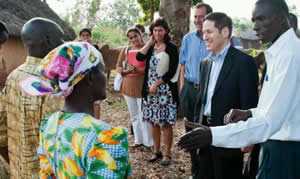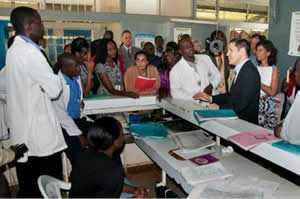Our Work in Kenya Reflects Our Global Commitment
Dr. Frieden Guest Blog

Community members who participate in disease surveillance projects that help prioritize interventions and save lives welcomed Dr. Frieden into their homes.
In January I had the privilege of traveling to Kenya to see first-hand some of the extraordinary international work done by CDC. During my stay, I was invited into homes of people who, everyday, simply by the circumstances of their surroundings, are dealing with significant challenges to maintain their health. In rural western Kenya, I met with a grandfather who had lost six of his children from preventable causes; I met a woman in Kibera who faces the ongoing challenges of poverty of that urban slum. Yet both of them had dignity and expressed hope and courage. I left with a heightened sense of respect for those who are at risk for poor health only for a lack of things that some of us take for granted: clean water, adequate nutrition, and access to basic health services.
The people who invited me into their homes were part of a population-based surveillance project supported by our International Emerging Infections Program (IEIP). With more than 50,000 participants, this project characterizes the burden and origin of disease among highly vulnerable populations in rural and urban Kenya, providing the health ministries with important information to prioritize interventions and save lives.
This project is integrated with the CDC and Kenya Medical Research Institute’s (KEMRI) Health and Demographic Surveillance System (HDSS), which has been instrumental in understanding the burden of many childhood illnesses, how disease spreads, patterns of health care use, and effectiveness of interventions. With KEMRI we support trials of vaccines and medications to reduce the burden of malaria, tuberculosis, and rotavirus; this benefits Kenya and the many countries burdened with these diseases.
I also had the privilege of meeting a young teacher receiving treatment for HIV. Thanks to the U.S. President’s Emergency Plan for AIDS Relief (PEPFAR), she and many others are receiving treatment that will allow them to lead long and productive lives. She and other teachers like her are leaders in their community and are vital to making the community thrive. While in Kenya, I was also struck by the commitment of the staff of Ministries of Health and our other partners. I was impressed by the passion and commitment of the trainees of the CDC-supported Kenya Field Epidemiology and Laboratory Training Program (KFELTP),who shared with me results from their research and outbreak investigations. As a graduate of CDC’s Epidemic Intelligence Service, on which the FELTP model is based, I am reminded that programs like it are critical to developing the public health leaders of tomorrow.

Dr. Frieden discussed ways to reduce mother-to-child HIV transmission and maternal mortality with staff in rural Kenya.
As I left Kenya, I was reminded why our work in Africa and other countries around the world is so important. Today, more than ever, our societies are interconnected. A health threat to anyone is a threat to everyone. Poor health damages our families, our communities and our livelihoods, and yet many illnesses can be easily and inexpensively prevented.
I am inspired by the progress that has been made in Kenya by Kenyans. Our partnership with the government and local partners, in collaboration with other U.S. government agencies and the U.S. Embassy in Kenya, continues because together we have made great strides in building the technical capabilities of public health professionals and improving public health systems. While there are still many challenges to improving the health of Kenyans, our progress shows that investment in global health is an excellent value.
- Page last reviewed: March 15, 2012
- Page last updated: March 15, 2012
- Content source:
Global Health
Notice: Linking to a non-federal site does not constitute an endorsement by HHS, CDC or any of its employees of the sponsors or the information and products presented on the site.


 ShareCompartir
ShareCompartir